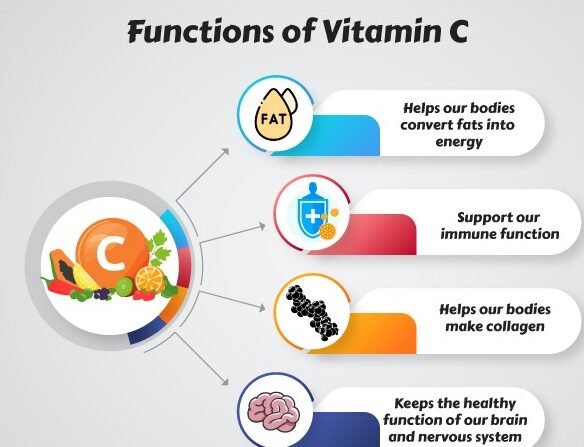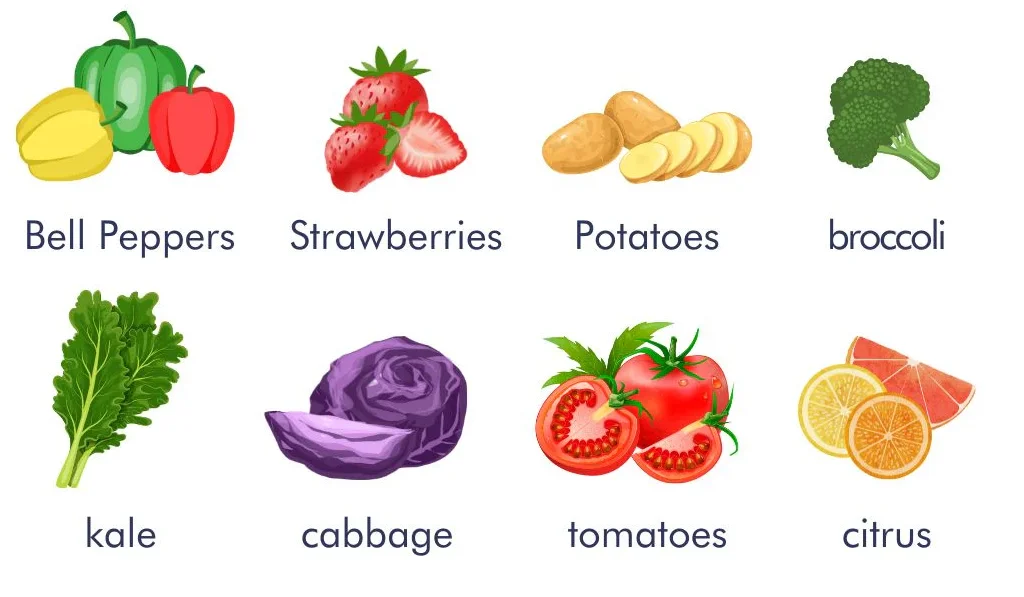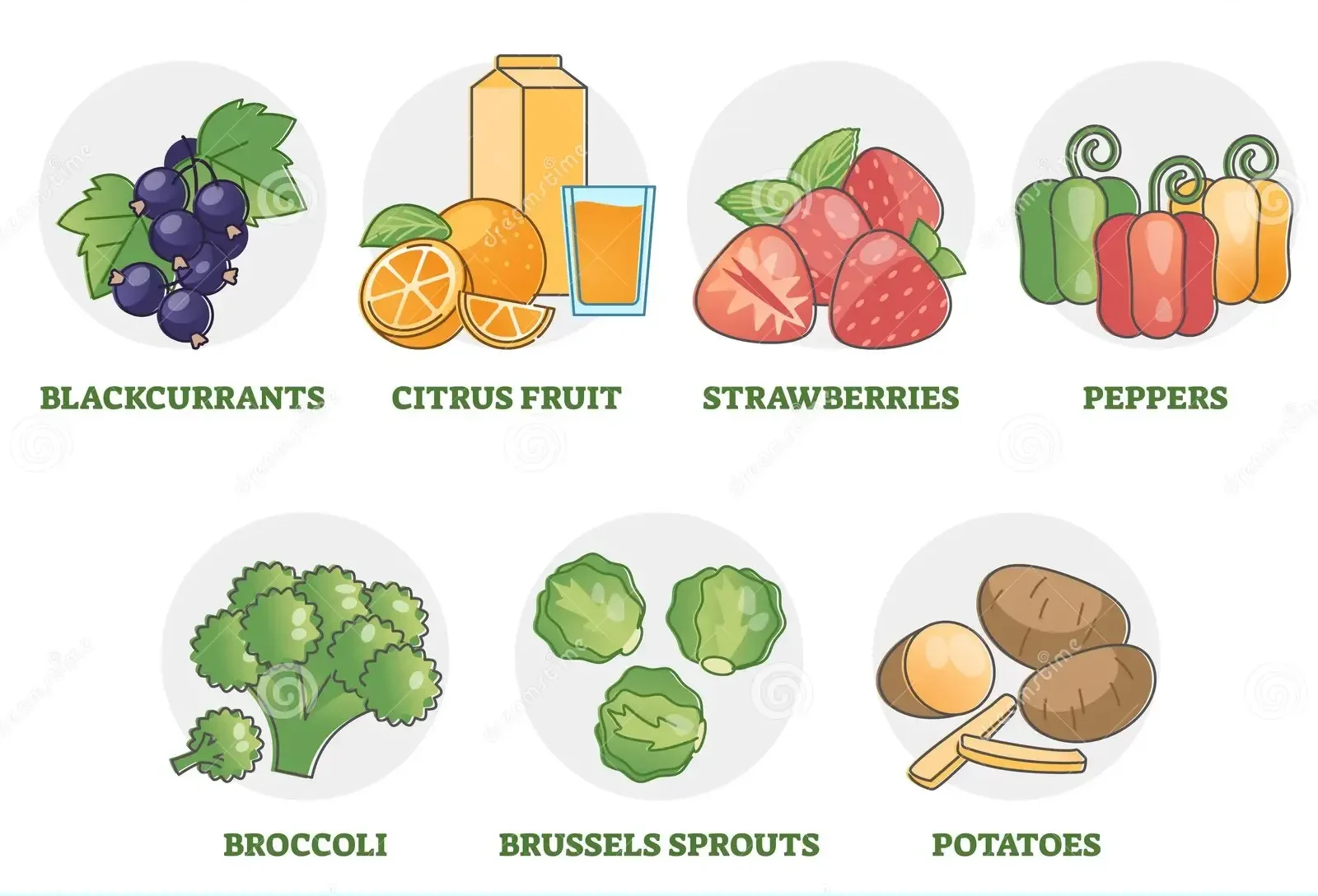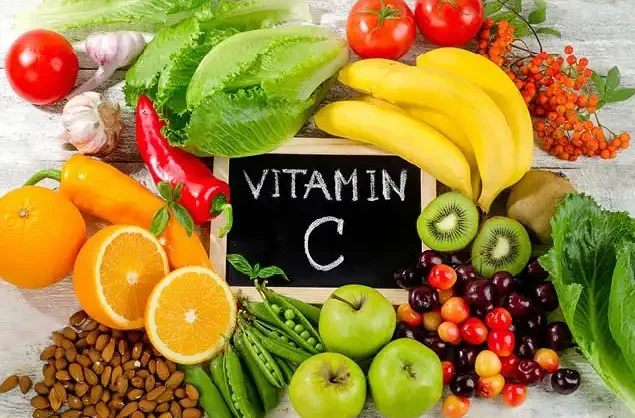Vitamin C has anti aging properties that slows down your age and make you look younger than your age.
However, the deficiency of Vitamin C has caused the deaths of approximately 2 million people.
The only reason for these deaths was that these individuals did not consume citrus fruits or fresh fruits. Although this was before 1932, when Vitamin C was discovered, its deficiency can still occur. Especially in smokers, who experience a rapid depletion of Vitamin C.
Today, we will learn about :
- What is vitamin C?
- Functions of vitamin C
- Daily requirement of vitamin C
- What do we say about it in the body?
- How can it fulfill its daily requirement?
Vitamin C, also known as ascorbic acid, is a water-soluble vitamin. This means it is not stored in the body, so you need to consume it regularly.
Understanding the Functions of Vitamin C

1. Vitamin C helps our body in the production of collagen. Collagen is a connective tissue that forms parts of the body such as blood vessels, nerves, bones, and cartilage; it provides strength to these structures. Vitamin C is crucial for collagen production.
2. It strengthens our immunity and helps protect against frequent infections.
3. It plays a role in treating and preventing the common cold.
4. Additionally, it is a powerful antioxidant that protects the body from oxidative damage.
5. It delays aging.
6. It offers protection against cancer.
7. It regulates many functions of the brain and nerves.
8. It helps maintain strong immunity.
Daily Requirement : Vitamin C
The requirement of vitamin C in children varies with age. For adults, the requirement is 75-90 mg/day, and during pregnancy and lactation, it increases to approximately 90-120 mg/day.

Smokers require an additional 35 mg of vitamin C per day because smoking accelerates the destruction and consumption of vitamin C in the body. Therefore, if smokers do not include fresh fruits in their diet, they are more prone to deficiency.
- 0-6 months: 40 mg/day
- 7-12 months: 50 mg/day
- 1-3 years: 15 mg/day
- 4-8 years: 25 mg/day
- 9-13 years: 45 mg/day
- 14-18 years: 75 mg/day
What Happens Due to Vitamin C Deficiency?
1. In fact, vitamin C deficiency is not very common. However, if you have not been consuming vitamin C for almost a month or if you are taking less than 10 mg/day (while the normal requirement for adults is 75-90 mg/day), you may experience vitamin C deficiency.
2. Vitamin C is essential for building collagen, blood vessels, bones, and ligaments in your body. Its deficiency can lead to frequent bleeding, gum swelling, and bleeding.
3. It can also cause frequent infections, repeated colds, illness, fatigue, and weakness.
4. Rough, dry skin and hair loss are also observed with vitamin C deficiency.
5. Additionally, an important point is that if you are not consuming enough vitamin C, the iron you eat will not be absorbed effectively.
This is especially true for plant-based iron found in vegetarian products. Vitamin C is necessary for iron absorption, and those deficient in vitamin C may experience anemia and further fatigue.
Food Sources : Vitamin C
Now let’s talk about sources of Vitamin C.

Most sources are plant-based, and in fact, all sources are plant-based. There are no animal products that serve as sources of Vitamin C; it is primarily found in fruits and vegetables.
Before discussing the sources, let’s understand a few basics:
- Vitamin C is a water-soluble vitamin.
- If you cook it, it dissolves into the water, and if you discard that water, the Vitamin C is lost. Therefore, please use the water in which vegetables are cooked instead of discarding it.
- Cooking at very high temperatures can destroy Vitamin C.
- The more raw and uncooked fruits and vegetables you consume, the more Vitamin C you will get.
- Fruits and vegetables that ripen on the plant contain more Vitamin C. As fruits mature on the tree, their Vitamin C content increases.
- Eating ripe fruits directly from the tree, without cooking, will provide you with the highest amount of Vitamin C.
How to Fulfil Daily Requirement?
Now, let’s look at Vitamin C sources to understand how much Vitamin C you can get from different fruits to meet your daily requirement of 75-90 mg/day:

1. Vitamin C is present in almost all fruits and vegetables, especially in citrus fruits.
2. You can get Vitamin C from oranges, lemons, kiwis, grapes, strawberries, and bell peppers.
3. Cruciferous vegetables such as broccoli, cabbage, cauliflower, papaya, and peas are also good sources.
4. Tamarind contains a significant amount of Vitamin C, about 90 mg/100 mg of tamarind.
5. Additionally, bitter gourd, peas, and coriander contain a considerable amount of Vitamin C.
6. Lemons, however, do not have as much Vitamin C as some other source.
How much is too much?
Let’s discuss the upper limit of Vitamin C intake. After the COVID-19 period, many people started taking Vitamin C supplements frequently.
However, since Vitamin C is water-soluble, the excess amount you consume will not be stored in your body; it will be excreted. You can easily tolerate doses up to around 3 grams, but going beyond this amount can lead to gastrointestinal side effects, such as difficulty digesting, diarrhea, vomiting, and even kidney stones.
So, avoid unnecessary supplementation. Consuming fruits and vegetables will meet your daily Vitamin C requirement.
Vitamin C deficiency can occur, especially in smokers. Try to include as many fresh fruits and vegetables in your diet as possible. Ideally, consume them raw to get the maximum nutrients.
If you are vegetarian, make sure to consume Vitamin C regularly. Without it, not only will you lack Vitamin C, but your body will also have difficulty absorbing iron, leading to iron deficiency or anemia.